Photographs: Reuters Dillip Satapathy in Bhubaneswar
The government's revalidation of the environment clearance for its steel plant in Odisha may not go far and it may still be years before the project takes off.
Work on the long-delayed integrated steel plant of Posco in Odisha will begin in a few weeks, said Prime Minister Manmohan Singh after meeting the South Korean president, Park Gyun-hye, in New Delhi last week.
His statement might have brought some cheer to the visiting Korean delegation and contributed to the success of the bilateral trade talks, but Posco India officials know there are large hurdles still ahead.
The prime minister's optimism was based on the recent revalidation of the environment clearance of the project by the Union ministry of environment and forest and the fresh recommendation by the state government to the Centre for granting prospecting licence to Posco for the Khandadhar iron ore mines.
"Getting land or the environment clearance is not a big issue; we are more bothered about the raw material for the project," says a company official.
…
Big hurdles ahead for Posco project in India
Photographs: Reuters
Ever since it signed a memorandum of understanding with Odisha in 2005, the South Korea-headquartered steel maker has stuck to its position of "no mine, no project".
This stand has become harder after the Vedanta fiasco (the company has spent Rs 50,000 crore for an aluminum plant in Odisha but has been denied access to bauxite mines allotted to it in the Niyamgiri hills). "We do not want a Vedanta-like situation," says the Posco official.
Though the Odisha government has submitted a fresh request to the Centre for the Khandadhar mines, getting the mining rights is still fraught with a lot of problems.
While disposing of a case related to the prospecting licence for the Khandadhar mines in May last year, the Supreme Court had asked the Union mines ministry to take up Posco's case but with the rider that the ministry would have to consider "all objections raised by various parties". It may be noted there were 226 claimants of these mines before the matter went to court.
So, the process of eliminating objections and allotting the prospecting licence to Posco may take a long time, point out analysts. There is also the possibility of some dissatisfied claimants going to court and stalling the process again.
…
Big hurdles ahead for Posco project in India
Image: A farmer collects betel leaves near POSCO India's Odisha Project site at Gobindpur village in Jagatsinghpur district in Odisha.Photographs: Reuters
Layers and layers of clearance
Even if Posco gets the prospecting licence, the next stage of getting a mining lease will be more arduous as the forest and environment issues will come into play.
Khandadhar being a scheduled area and with a precedent like Niyamgiri, the forest diversion and environment issues are likely to be decided through gram sabhas (village committees).
Already, local protests are building up in Khandadhar to Posco's proposed mining plan. These will only get shriller once the gram sabhas take up the matter, hurting Posco's chances to start mining iron ore.
"In India, from the grant of a prospecting licence to the start of mining, it takes eight to nine years. So Posco has to look for raw material linkage from alternative sources before it can operate its own mines if it builds the plant in the next three to four years," points out BS Pani, an industry expert.
The company has held preliminary discussions on sourcing raw material from state-owned Odisha Mining Corporation in the event of a delay in operating its captive mine. But given the efficiency of this company, which is unable to even meet the need of smaller steel plants in the state, Posco is sceptical about depending solely on the state-owned miner.
...
Big hurdles ahead for Posco project in India
Image: Children shout slogans as police stand guard during a protest against land acquisition at Gobindpur village in Jagatsinghpur district in Odisha.Photographs: Reuters
From one hurdle to another
After captive mines, the next roadblock is the captive port. While revalidating the environment clearance, the environment ministry has delinked the port from the steel plant. The company had received an environment clearance for the captive port in May, 2007. But the five-year validity of the permission has expired.
Though the Odisha government has submitted the CRZ (coastal regulation zone) compliance report according to the revised guideline, the renewal of environment clearance of the port project is yet to pass the environment ministry's scrutiny.
"The captive port is crucial for the start of work on the Posco plant as the company will bring heavy equipment through this port. Besides, the sand dredged from Jatadhari Muhan (the location of the port) will be used to raise the ground level of the plant site, which is very shallow. In other words, the building of the port will precede the steel plant. So, with no environment clearance for the port as of now, how can someone think of starting work on the steel plant?" says Pani.
...
Big hurdles ahead for Posco project in India
Image: Demonstrators shout slogans during a protest against land acquisition at Gobindpur village in Jagatsinghpur district in Odisha.Photographs: Reuters
The company is also in a quandary over the direction of the environment ministry to spend 5 per cent of the project cost for social commitments in the site area. This is expected to push up the project cost by about Rs 2,600 crore (Rs 26 billion).
"Perhaps for the first time, the environment ministry has asked a company to spend such a huge amount on socio-economic uplift of local people," says RP Panda, an industry analyst.
The Odisha government last year had asked Posco to spend about Rs 250 crore (Rs 2.5 billion) to upgrade the socio-economic infrastructure in the site area. However, the company had evaded the task on the plea that it will be difficult to get the board's approval for such a large amount when it was not assured of land and mines to take the project forward.
"How can you now expect the company to spend ten times of that amount without any substantial change in the status of the project," asks a government official. "There is no clarity on the issue. We will wait for the framing of necessary policy guidelines by the government before acting on it," says a senior Posco official.
...
Big hurdles ahead for Posco project in India
Image: A villager walks at the POSCO India Odisha Project site office at Gobindpur village in Jagatsinghpur district, in OdishaPhotographs: Reuters
The Odisha government's MoU with Posco expired in June 2010, but it has not been renewed yet. With the law department opining against renewal post-facto, the state government had decided to enter into a tripartite agreement with Posco India and its Seoul-based parent, which will replace the earlier MoU.
Though the negotiation for this pact ended more than two years ago, the document is yet to be inked. "Being a foreign company, Posco would want all the issues thrashed out to its satisfaction before it commits any large investment or start work at the ground. Till that time, you may see some pre-project tasks like felling of trees or construction of boundary wall. The actual project work may take a few months or even a couple of years to start," Panda opines.
For Posco, the long journey to producing steel in Odisha isn't over yet.
Big hurdles ahead for Posco project in India
Image: A woman sits on the ground at a transit camp for villagers who have been displaced in Jagatsinghpur district, about 75 km east of Orissa's state capital BhubaneswarPhotographs: Vivek Prakash/Reuters
VILLAGERS OPEN A NEW FRONT
To add to Posco’s woes, there have been persistent strikes by local villagers at the plant site. Earlier, it was the protracted agitation by the Posco Pratirodh Sangram Samiti that delayed land acquisition for the project. Now, the villagers of Gadakujang and Nuagaon panchayats, hitherto known to be supporters of the project, have demanded fresh compensation and raised livelihood issues.
Thousands of villagers, including those to be displaced in Polang, Noliasahi and Bhuyianpal villages, are on mass dharna for the last one week, threatening to bring down the boundary wall that is being constructed around the acquired land. “The affected villagers have some demands. But these can only be addressed in the RPDAC (Rehabilitation and Peripheral Development Advisory Committee) meeting which is being planned in the last week of this month or the first week of February,” says Satya Kumar Mallick, the district collector of Jagatsinghpur.
Against the revised request of Posco to provide it 2,700 acres of land (initially it had requested for 4,004 acres to build a 12 million tonne steel plant) to enable the company to start the first phase of 8 million tonnes, the Jagatsinghpur district administration has handed over only 1,700 acres till date; the process is on to hand over the rest 1,000 acres to the company.
“Even if we hand over the entire land, they cannot start any work on it because of the restrictions imposed by the National Green Tribunal,” points out an officer of the district administration. The tribunal has put curbs on felling of trees at the project site after a petition was filed by a green activist. Trees numbering about 100,000 need to be cut down to clear the site for construction.
...
Big hurdles ahead for Posco project in India
Image: Children gather at the entrance of their thatched hut in Gobindpur village, about 75 km east of Orissa's capital Bhubaneswar . Gobindpur is one of several villages from which people will have to be relocated for the plant.Photographs: Vivek Prakash/Reuters
THE LONG ROAD TO ODISHA
June 2005: Posco signs MoU with Odisha government to set up a 12-million-tonne steel plant
Aug 2008: Supreme Court upholds “in principle” clearance for use of forest land for the project
Dec 2009: Environment ministry grants clearance for diversion of forest land
July 2010: Odisha High Court cancels prospecting licence for an iron ore mine to Posco
Oct 2010: State govt moves the Supreme Court against the order
Jan 2011: Environment ministry grants conditional clearance to the project
March 2012: National Green Tribunal suspends the environment clearance
May 2013: Supreme Court strikes down the Odisha High Court order; asks the Centre to decide on granting mine to Posco
July 2013: Odisha completes acquisition of 2,700 acres of land for the project
Jan 2014: Environment ministry revalidates green clearance of the plant

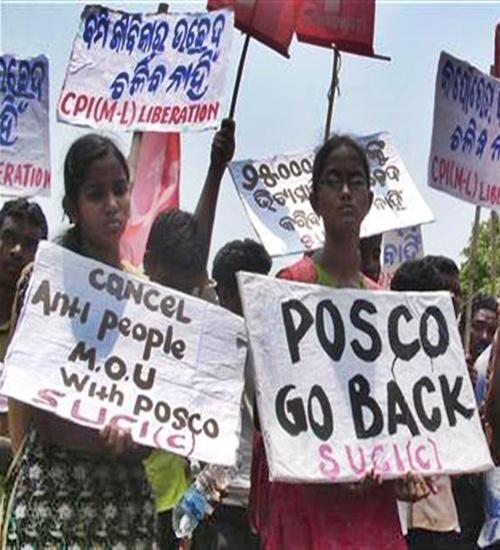
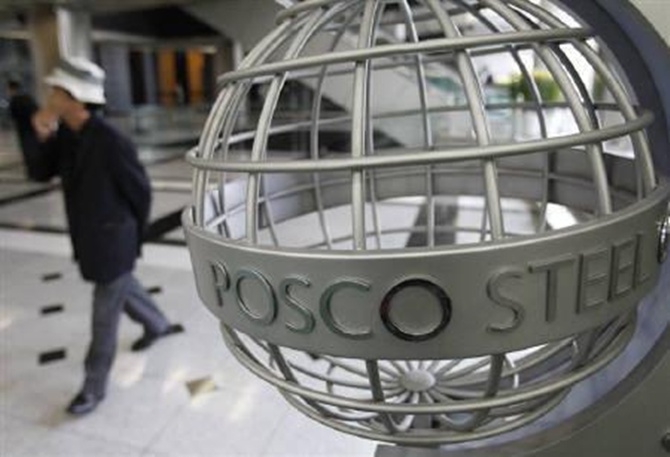
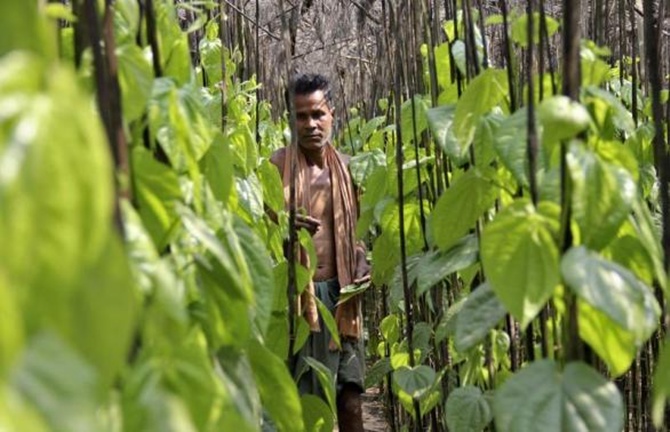

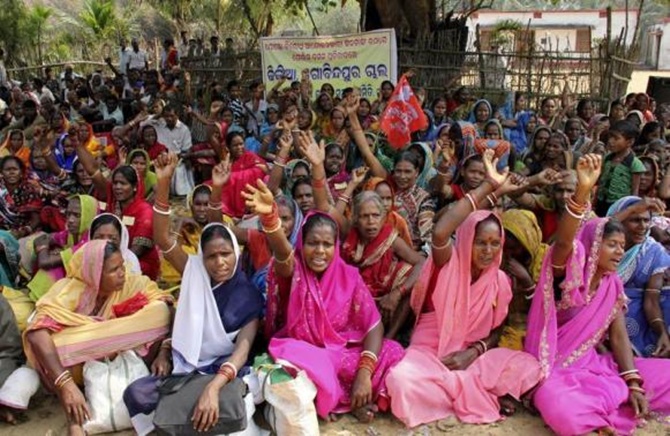
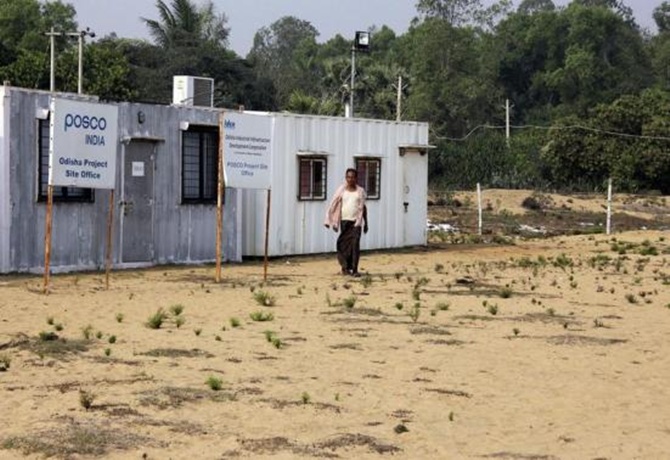
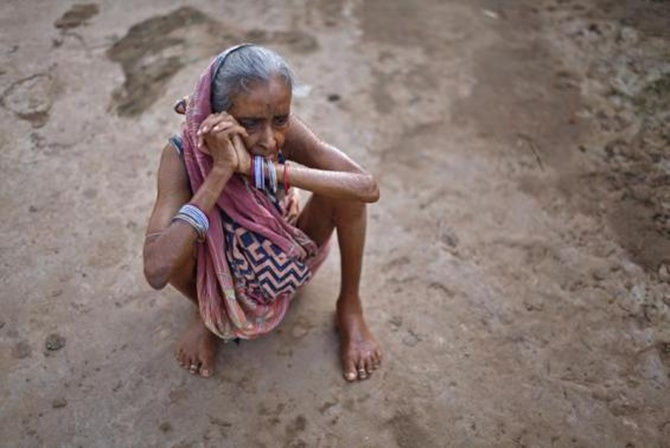


article